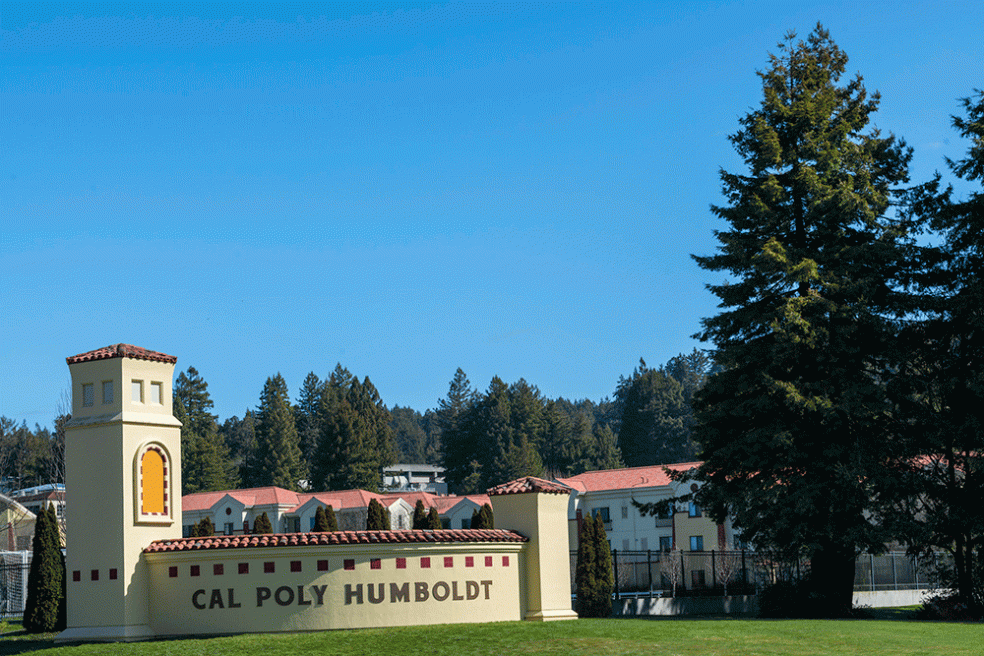
The roots and branches of cannabis research extend well beyond its traditional beds of botany and social justice, spreading tendrils to settler colonialism, global capitalism, and environmental stewardship.
This was the impetus behind The Routledge Handbook of Post-Prohibition Cannabis Research, a collection of chapters touching on the global impact of cannabis legalization while conditions of prohibition still exist. The book was edited by the co-directors of Cal Poly Humboldt’s Humboldt institute for Interdisciplinary Marijuana Research (HIIMR), Sociology Professor Joshua S. Meisel and Dominic Corva, executive director for the Center for the Study of Cannabis and Social Policy.
Meisel and Corva are spearheading the University’s Cannabis Studies program. It’s one of 12 new academic programs—expected to launch in Fall 2023—being funded through the state’s historic $458 million investment to support the University’s transition into a polytechnic institution.
“We share a belief that examining cannabis in society is very much a gateway to examining broader issues,” says Meisel, who is conducting dispensary-based research on the use of oral cannabis products to address chronic pain and sleep disruption in older adults. “The study of cannabis provides an effective vehicle for thinking critically about neoliberalism, capitalism, environmental stewardship, equity, and racial justice.”
The Routledge Handbook includes several chapters by Cal Poly Humboldt professors.
- Kaitlin Reed, Native American Studies, on settler colonialism and tribal sovereignty.
- Whitney Ogle, Kinesiology & Recreation, on cannabis and exercise
- Joshua Zender, School of Business, on cannabis and banking
- Anthony Silvaggio, Sociology, on the environmental impact of cannabis liberalization
- Erin Kelly, Forestry, and alumna Marisa Formosa (’18, Social Sciences, Environment & Community), on cannabis production and ecological restoration
“This captures a broad range of interdisciplinary critical studies,” says Corva. “Cannabis is a subject that intersects with many other fields of well-established scholarly research agendas.”
Cal Poly Humboldt’s program would offer a B.A. in Cannabis Studies with concentrations in Equity and Social Justice or Environmental Stewardship. The program would be only the seventh undergraduate program of its kind in the country and the first to have a liberal arts core with an interdisciplinary curriculum.
Corva, Meisel, and the chapter authors from Cal Poly Humboldt are hosting a panel discussion about the book and the new degree program at the Library Fishbowl on Friday, April 22, from 4 to 5:30 p.m.
For more information, contact Dominica Corva: Dominic.Corva@humboldt.edu, (206) 228-0509.
About the Humboldt institute for Interdisciplinary Marijuana Research
Established in 2012, the Humboldt Institute for Interdisciplinary Marijuana Research is the first academic research institute devoted to cannabis research. It is a research and analysis organization created to fill various information gaps about marijuana issues. The Institute conducts, analyzes, and disseminates research and provides expertise to policy makers, health care and medical professionals, business, and the media, among others. An information clearinghouse, the Institute promotes rigorous scholarly and scientific study of marijuana issues. The Institute’s purpose is analysis, not advocacy. It takes no position, for example, on legalization or decriminalization.